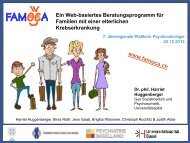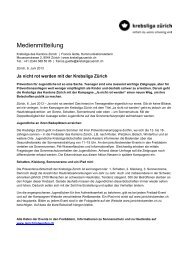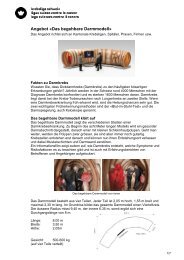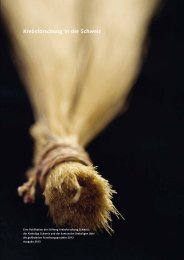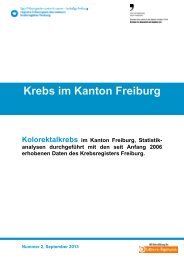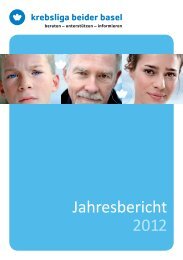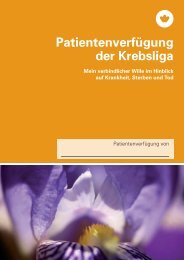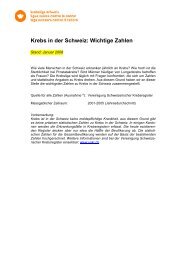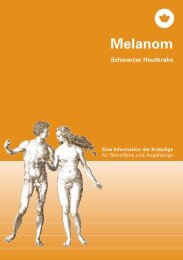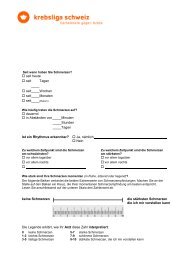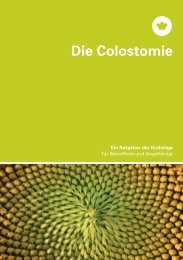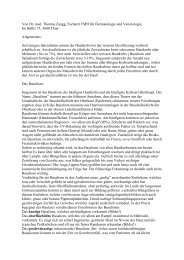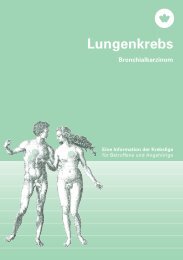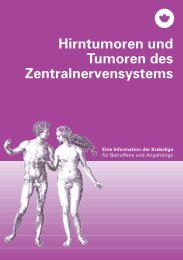Cancer Research in Switzerland - Krebsliga Schweiz
Cancer Research in Switzerland - Krebsliga Schweiz
Cancer Research in Switzerland - Krebsliga Schweiz
Create successful ePaper yourself
Turn your PDF publications into a flip-book with our unique Google optimized e-Paper software.
184<br />
It is <strong>in</strong> this context that the Swiss <strong>Cancer</strong> League organizes<br />
Communication Skills Tra<strong>in</strong><strong>in</strong>g (CST) with the aim to improve<br />
the communication skills of oncology cl<strong>in</strong>icians<br />
(physicians and nurses). Conducted <strong>in</strong> small groups of<br />
8–10 participants and with a total duration of 30 hours,<br />
CST starts with a videotaped <strong>in</strong>terview conducted by each<br />
participant with a simulated patient and is followed by an<br />
analysis of and feedbacks on the videos, role-plays and<br />
transmission of communication theory. CST is completed<br />
with <strong>in</strong>dividual monthly supervision for a period of six<br />
weeks and a second videotaped <strong>in</strong>terview with a simulated<br />
patient.<br />
This study aimed to evaluate the l<strong>in</strong>guistic aspects of CST<br />
based on the videotaped <strong>in</strong>terviews; the evaluations consisted<br />
of a comparison of the first and the second videotaped<br />
<strong>in</strong>terview <strong>in</strong> CST (pre-/post-comparison) and a comparison<br />
with <strong>in</strong>terviews of cl<strong>in</strong>icians who did not participate<br />
<strong>in</strong> CST and who <strong>in</strong>terviewed the same simulated patients<br />
with the same scenarios with a six months <strong>in</strong>terval. The<br />
group of cl<strong>in</strong>icians hav<strong>in</strong>g participated <strong>in</strong> CST consisted of<br />
57 and the control group of 56 oncology physicians and<br />
nurses.<br />
Communication skills of cl<strong>in</strong>icians were evaluated and<br />
measured by means of communication analysis software<br />
(LaComm) developed at the Institut Jules Bordet (Brussels,<br />
Belgium) by the team under psycho-oncologist<br />
Darius Razavi. This software analyzes the logistic content<br />
(sentences and words) of <strong>in</strong>terviews and categorizes them<br />
by tak<strong>in</strong>g <strong>in</strong>to account the three major functions of a consultation:<br />
<strong>in</strong>vestigation, support and transmission of <strong>in</strong>formation.<br />
In total, the l<strong>in</strong>guistic content of the <strong>in</strong>terviews<br />
is assigned to 44 specific categories; for example, an utterance<br />
like “Did you start treatment?” is categorized as<br />
“closed b<strong>in</strong>ary evaluation”, or words like “sad” or “distress”<br />
are categorized as “psychological <strong>in</strong>formation”.<br />
This study demonstrated that cl<strong>in</strong>icians who participated<br />
<strong>in</strong> CST are more <strong>in</strong>cl<strong>in</strong>ed than those <strong>in</strong> the control group<br />
to break bad news by us<strong>in</strong>g precise words without us<strong>in</strong>g<br />
medical jargon and that they focus more on psychosocial<br />
issues, recogniz<strong>in</strong>g the patient as a subject.<br />
This study demonstrated a positive impact of CST on the<br />
communication skills of oncology cl<strong>in</strong>icians, s<strong>in</strong>ce the observed<br />
changes are <strong>in</strong> accordance with patient-centred<br />
communication.<br />
Project coord<strong>in</strong>ator<br />
Prof. Dr Friedrich Stiefel<br />
Service de psychiatrie de liaison<br />
Centre hospitalier universitaire vaudois (CHUV)<br />
Bugnon 44<br />
CH-1011 Lausanne<br />
Phone +41 (0)21 314 10 90<br />
Fax +41 (0)021 314 10 86<br />
frederic.stiefel@chuv.ch<br />
von der Weid Nicolas | Long-term outcome of childhood<br />
cancer: Incidence and spectrum of late effects<br />
(KLS 02215-02-2008)<br />
Aim of the study<br />
The Swiss Childhood <strong>Cancer</strong> Survivor Study (SCCSS) is a<br />
common project of the Swiss Childhood <strong>Cancer</strong> Registry<br />
and the Swiss Paediatric Oncology Group and is run at the<br />
Institute for Social and Preventive Medic<strong>in</strong>e of the University<br />
of Bern. Aim of the SCCSS was to know, <strong>in</strong> general<br />
and <strong>in</strong> many specific aspects, how survivors were do<strong>in</strong>g,<br />
what k<strong>in</strong>d of late effects they suffered from, to detect<br />
them as early as possible and to treat or alleviate them.<br />
Knowledge about long-term toxicities would help to design<br />
newer treatment strategies with same efficacy and<br />
less morbidity.<br />
Methods<br />
Included <strong>in</strong> the SCCSS were all children and adolescents<br />
diagnosed with a malignant disease <strong>in</strong> <strong>Switzerland</strong> between<br />
1976 and 2003. We looked for current addresses<br />
<strong>in</strong> the former medical files of the patients and through an<br />
Internet-based search system. Survivors with established<br />
addresses received at their home a comprehensive health<br />
questionnaire <strong>in</strong> the years 2007–2010.<br />
Results<br />
First results are already available <strong>in</strong> many doma<strong>in</strong>s and<br />
have been or will be published soon.<br />
Psychological health<br />
Psychological troubles are not different <strong>in</strong> frequency or<br />
severity <strong>in</strong> survivors of paediatric cancer and <strong>in</strong> the general<br />
population. But the proportion of people with severe<br />
troubles was higher <strong>in</strong> the survivors, so that <strong>in</strong> our op<strong>in</strong>ion,<br />
psychological support should be offered to this population.<br />
Socio-economic and education status<br />
Compar<strong>in</strong>g education level reached <strong>in</strong> survivors and the<br />
general population, no major differences were found. Initially,<br />
survivors had more school difficulties, e. g. needed<br />
to repeat one school year or received teach<strong>in</strong>g support,<br />
but they eventually achieved the same levels of education<br />
as the control population. As expected, survivors of bra<strong>in</strong><br />
tumours and patients hav<strong>in</strong>g had a relapse of their primary<br />
cancer (especially leukaemia) showed more problems<br />
and often achieved lower education levels.<br />
Health behaviours (use of alcohol, tobacco, cannabis)<br />
We found different groups of behaviours <strong>in</strong> the survivors<br />
of cancer; compared to the controls, a larger proportion of<br />
survivors, especially men, engaged <strong>in</strong> b<strong>in</strong>ge dr<strong>in</strong>k<strong>in</strong>g (i. e.<br />
consumption of large amounts of alcohol <strong>in</strong> a short period<br />
of time). Survivors were more active than controls <strong>in</strong> daily<br />
physical activities but engaged less <strong>in</strong> sports, especially<br />
women.



